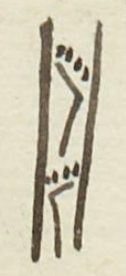Iyaqui (MH638v)
This black-line drawing of the simplex glyph for the personal name Iyaqui, "Young Valiant Warrior," is attested here as a man's name. The glyph includes two human footprints within vertical parallel lines. The footprints are heading upward. The adverb (iyaquic, which is a close homophone, means "on foot" or "upright"), which may explain the semantic use of the footprints.
Stephanie Wood
It could also be that the foot is upright as a phonetic aid (pointing to iyaquic, upright or on foot) to help with the reading.
Footprint glyphs have a wide range of translations. In this collection, so far, we can attest to yauh, xo, pano, -pan, paina, temo, nemi, quetza, otli, iyaquic hualiloti, huallauh, tetepotztoca, totoco, -tihui, and the vowel "o." Other research (Herrera et al, 2005, 64) points to additional terms, including: choloa, tlaloa, totoyoa, eco, aci, quiza, maxalihui, centlacxitl, and xocpalli.
Stephanie Wood
yyagui
Iyaqui
Stephanie Wood
1560
Jeff Haskett-Wood
huellas, footprints, pasos, steps, icximachiyotl, xocpalli, icxipamitl, to go, irse, ido, se fué, nombres de hombres

iyaqui, young valiant warrior, https://nahuatl.wired-humanities.org/content/iyaqui
iyaquic, on end, upright, or on foot, https://nahuatl.wired-humanities.org/content/iyaquic
Ido o De Punta
Stephanie Wood
Matrícula de Huexotzinco, folio 638v, World Digital Library, https://www.loc.gov/resource/gdcwdl.wdl_15282/?sp=359&st=image.
This manuscript is hosted by the Library of Congress and the World Digital Library; used here with the Creative Commons, “Attribution-NonCommercial-ShareAlike 3.0 License” (CC-BY-NC-SAq 3.0).








